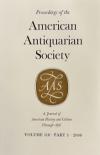American Antiquarian Society

|
Isaiah Thomas: Patriot Printer | Isaiah Thomas (1749-1831) was the foremost printer of the generation that came of age during the American Revolution. This resource explores Thomas’s life and American history and culture through selected documents that Thomas had a personal relationship with. Video, primary sources, lesson plans, an online game, and additional resources for use in the classroom are available. |
| |
Ohio Name Index, 1796-1850 | This index includes 286,645 names of Ohio people, businesses and institutions whose names appear in the books, pamphlets and broadsides printed in Ohio from 1796 through 1850, and are listed in the Morgan Bibliography of Ohio Imprints, 1796-1850. The index is compiled and maintained by Richard P. Morgan. |
| |
Student, Teacher, and Trustee Database Project, 1800-1900 | This database contains over 1 million entries of students, teachers, and trustees whose names appear in the catalogues from 1800-1900 of the American Antiquarian Society's School and College Collection. The index is compiled and maintained by Richard P. Morgan. |

|
The Acquisitions Table | A thriving acquisitions program allows the American Antiquarian Society curators to actively add material through gift and purchase. New acquisitions are periodically highlighted in the "The Acquisitions Table" section of Past Is Present, the AAS Blog. |

|
Past is Present | The blog of the American Antiquarian Society. At AAS, we are infinitely proud of the scholarly, nose-to-the-book (or newspaper, or graphic art, or manuscript) work that goes on in Antiquarian Hall, but we invite you to take a minute and enjoy the lighter side of our people and collections. |

|
Printers' File Online | Since Isaiah Thomas’s research for his ambitious The History of Printing in America (1810), the Society has held the largest set of data on the early printing trade in what is now the United States. Starting in 1927, Avis Clarke, AAS’s first trained cataloger, compiled a card catalog that came to be known as the Printers’ File during her 43 year tenure here. For many decades, these twenty-five drawers of cards could only be accessed in our reading room, a resource that became known as the Printers’ File. |

|
A Boy's Education Among the Reformers | The Journals of Edmund Quincy Sewall Jr., 1837-1840 Thoreau scholars have long been aware of the journal kept in Concord, Massachusetts during a period of seven weeks in 1840 when twelve-year-old Edmund Quincy Junior was attending John and Henry David Thoreau’s Concord Academy and boarding in the Thoreau household. |

|
Proceedings of the American Antiquarian Society | Digital collection of the Proceedings is available for new series volumes 1 (December 1880) through 118 (October 2008). This journal has been a source for AAS members' obituaries, articles, bibliographies, and tools for scholarship within the general area of American history and culture through 1876. The Proceedings ceased publication with volume 118, part 2, dated October 2008. |

|
American Vernacular Music Manuscripts, ca. 1730-1910 | This is a collaborative project between the Center for Popular Music and the American Antiquarian Society to inventory, catalog, digitize, and provide web-based public access to their extensive music manuscripts collections. It concerns manuscripts inscribed before 1910 that are mainly American in provenance, with contents that are preponderantly vernacular in style. The digital collection includes 345 music manuscripts and is available on the Internet Archive. |
| |
Morgan Bibliography of Ohio Imprints, 1796-1850 | The Morgan Bibliography of Ohio Imprints, 1796-1850 describes books, pamphlets, and broadsides printed in Ohio, from the earliest in 1796 through 1850. |